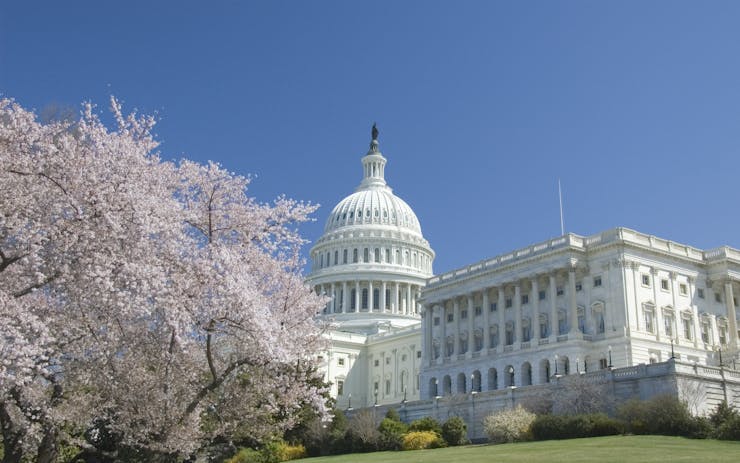US Attorney General Jeff Sessions filed a blockbuster lawsuit against California this week, arguing that so-called sanctuary laws passed by the state Legislature conflict with federal immigration laws.
Federal law is “the supreme law of the land,” Sessions told a crowd of about 250 law enforcement officials in Sacramento on Wednesday, lashing out at state and local leaders for taking actions that “directly and adversely impact the work of our federal officers.”
“You can be sure,” he vowed, “I’m going to use every power I have to stop them.”
While the lawsuit centers on immigration, the central question parallels one familiar to the cannabis community: When state law says one thing and federal law says another, who wins?
The State–Federal Fight
It’s a question that has loomed over cannabis for decades, stretching back at least to the passage of California’s first medical marijuana law, in 1996. But with nine states having legalized cannabis for adult use and dozens more having passed medical cannabis laws, the conflict today is clearer than ever.
“The federal government could go into any state right now and arrest any individual growing marijuana.”
Under federal law, all forms of cannabis remain illegal. It’s still a Schedule I controlled substance, more tightly regulated than opium or cocaine. When Sessions claims cannabis “is illegal in the United States—even in Colorado, California, and everywhere else in America,” he’s right. But, of course, that’s not the whole story. Many states now license, regulate, and tax state-legal cannabis activity, and that’s where things get hairy.
Legal on one level, outlawed on another. To try to solve this tug-of-war, some people point to the US Constitution’s supremacy clause, which says federal law takes precedence over state laws. But according to legal scholars and policy experts, it’s not nearly that simple.
Conflicts on Conflicts
Although the supremacy clause can help courts make sense of conflicting laws, judges have to balance its claims against other constitutional considerations, says Karl Manheim, a constitutional law professor at Loyola Law School in Los Angeles.
“As is often the case in constitutional law, we have an equal and opposite constitutional command in the 10th Amendment, which says that states have a certain degree of autonomy and that Congress cannot commandeer state processes,” Manheim said. The anti-commandeering doctrine, as it’s known, limits the supremacy clause by prohibiting the federal government from forcing states to do its bidding.
Occasionally the conflict is obvious and easy to spot. If Congress were to pass a law expressly barring states from taxing the sale of silly hats, a state law establishing a tax on silly hats would clearly violate the supremacy clause. On the other end of the spectrum, if Congress were to ban silly hats outright, states could freely pass laws preventing local police departments from enforcing that federal law. “As a general principle,” Manheim said, “states don’t have any constitutional obligation to cooperate with any federal agency.”
But more often than not, the conflicting constitutional provisions create a gray area that courts must navigate on a case-by-case basis.
“The general principle is the same across the board,” Manheim said, “but it’s all in the details. And that is: Is there a conflict?”
Well? Is There?
Exactly what constitutes a conflict is open to interpretation. Much of it hinges on whether or not state law actually hinders federal enforcement efforts.
Suppose a state passes a legalization law like the one Vermont recently adopted. Possession, consumption, and personal cultivation of cannabis are all allowed under state law, but there’s no provision for commercial sales. In effect, the state removed all penalties for certain cannabis activity. That’s relatively unlikely to violate the supremacy clause, because the state isn’t taking any steps to prevent US officials from enforcing federal law.
Other states have opted to license and tax legal cannabis businesses, which could raise separate conflict questions. Is it OK for those states to sanction and earn tax revenue from federally illegal activity? Further conflict questions would arise if a state were to actively impede the work of federal authorities, for example by passing a law to prevent federal investigators from entering state-licensed dispensaries.
John Hudak, a senior fellow at the Brookings Institution who studies cannabis policy, says that even in states that have legalized adult-use cannabis, federal officials are still free to pursue charges against state-legal actors.
“The federal government could go into any state right now and arrest any individual growing marijuana,” he said. “There is no question the government has the authority to do that.”
What’s more, federal prosecutors are able to prevent cannabis defendants from arguing in court that their activity is allowed under state law.
“In a case against a recreational grower or distributor or whatever, the status of state law is entirely irrelevant and has no place in a federal proceeding. A federal judge will not allow evidence of state legality,” Hudak said. (Note: This doesn’t apply to medical cannabis, at least for the moment. A federal spending provision set to expire later this month, known as the Rohrabacher-Blumenauer amendment, currently prohibits the Justice Department from prosecuting state-compliant medical cannabis patients and providers.)
So far, legal-cannabis states have also been careful to avoid passing laws intended to block federal enforcement efforts, says Vanderbilt Law School professor Robert Mikos, an expert on federalism and cannabis laws. Such laws would be especially vulnerable to supremacy-clause challenges.
“States forthrightly acknowledge, ‘Hey, the fact we made this legal doesn’t do you any good under federal law,’” Mikos said. “They haven’t sought out that sort of direct confrontation with the federal government.”
Questions for the Court
If a conflict can’t easily be solved by referring to the Constitution’s supremacy clause or anti-commandeering doctrine, judges’ jobs get harder. They must refer to existing court precedent and then extend that to the dispute at hand.
“The important thing to recognize with preemption is it basically nullifies state law.”
Here’s where immigration and cannabis part ways, said Manheim at Loyola Law School. Unlike most other areas of law, immigration is generally considered an element of foreign policy—something in which, courts have recognized, the federal government has a special stake.
“Ordinarily when there is a conflict between state and federal law and there is some question as to whether the state law is obstructing or preempted by the federal law, the tie usually goes to the state,” Manheim said. “The rule works the other direction when we’re talking about things of paramount federal importance, and immigration is one of those.”
While some past rulings have determined that cannabis is of dominant federal interest, he said, that’s not as well established as it is with immigration. That means states may have more leeway in passing cannabis laws, rather than immigration laws, that seem to run counter to federal policy.
What Would the Feds ‘Win’?
Even if the Justice Department were to successfully challenge a state law that legalized and regulated cannabis, it’s not clear officials would have much to show for it. “The important thing to recognize with preemption is it basically nullifies state law,” said Mikos at Vanderbilt. “It doesn’t replace it with what it was before.”
If a court were to overturn California’s cannabis law, he explained, “that doesn’t mean you roll back the clock to 2015 and say, ‘All right, now prohibition is still on the books for adult-use marijuana.’”
In other words, challenging a state legalization law could actually undermine the objectives of prohibitionists, Mikos said. Overturning California’s cannabis laws would remove the state’s ability to regulate the cannabis industry, but it wouldn’t dissolve the industry or reinstate prior criminal laws against cannabis.
Even if Jeff Sessions were to topple state cannabis laws, it’s possible that his only prize would be throwing a multibillion-dollar industry into chaos. Mikos said, “It’s hard to imagine Congress would be happy with that outcome.”





